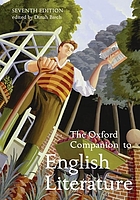Reference Books
Don't know anything about your topic? Start here! Reference books, such as dictionaries and encyclopedias, are great tools for learning about a topic. The background information and summaries they provide will prepare you to better engage with meatier resources such as books and journal articles. Below are a few reference items to help you get started.
- Bloom's Literature This database examines great writers, important works, memorable characters, and influential movements and events in world literature. Content includes biographies, criticism and streamed videos.
- The Cambridge Companion to Milton This volume introduces readers to the scope of Milton's work, the richness of its historical relations, and the range of current approaches to it
- MLA Handbook The 8th edition of the MLA Handbook breaks new ground by prescribing one universal set of guidelines which can be applied to any source, rather than providing separate instructions for documenting each format.
- The Princeton Encyclopedia of Poetry and Poetics Provides the most comprehensive and authoritative reference for students, scholars, and poets on all aspects of its subject including history, movements, genres, prosody, rhetorical devices, and critical terms.
Books and eBooks
Search the library's catalogue for print and ebooks.
When consulting books for your Annotated Bibliography, consider the question of authority: who is the author, what are his/her credentials and affiliations? Who is the publisher of the book?
Remember that authority is in many ways constructed and contextual. For example, Bart D. Ehrman, James A. Gray Distinguished Professor of Religious Studies at the University of North Carolina, is a New York Times best-selling author and according to his Wikipedia entry, "one of North America's leading scholars in his field." His credentials would seem to make him an authority. Yet the fact that he denies the resurrection should make us consider the idea of authority with a healthy skepticism. Be open yet critical and discerning.
The reader of your annotated bibliography will also be interested in the accuracy of a particular book. What claims is the author making, and do these find support in the text itself? Does the author interact with other scholars and sources? Are there any factual errors that could call into question the reliability of the scholarship?
Reference Books in the Library
The Dictionary of Poetic Terms by
Call Number: PN 1042 .M93 2003ISBN: 1574411667Publication Date: 2003-07-24 The Oxford companion to English literature by Call Number: EbookISBN: 019173506XPublication Date: 2009Older Print Book Available: PR 19 .O93 2000
The Oxford companion to English literature by Call Number: EbookISBN: 019173506XPublication Date: 2009Older Print Book Available: PR 19 .O93 2000The Encyclopedia of Twentieth-Century Fiction by
Call Number: PR 881 .E48 2011ISBN: 9781405192446Publication Date: 2011-01-18
Journal Articles
- Academic Search Premier Academic Search Premier is a multi-disciplinary database that provides full text to over 4,000 scholarly journals. The archives for these journals data back to 1975 and before.
- Atla Religion Atla Religion Database with Atla Serials is the premier index to journal articles, book reviews, and collections of essays in all fields of religion.
- JSTOR JSTOR contains an archive of over 600 academic journals in the arts and sciences right back to the beginning of each title. When searching for articles select "Language & Literature" to limit your search to articles on literary theory and criticism.
- Milton Studies Recent issues of this indispensable annual journal are available online through Project Muse. Content from previous years is indexed in the MLA International Bibliography and available in print at the Education Library.
- Project Muse Project Muse provides current electronic access to over 350 academic journals in many academic disciplines. Titles in this collection are published by nonprofit and University Presses.
Two criteria you will want to think about when preparing your Annotated Bibliography are currency and authority. All of the databases above will allow you to refine your search results by publication date, and most will allow you to limit your results to include only peer-reviewed articles. Peer-reviewed journal articles have been evaluated for scholarly quality by an independent expert in the same field prior to being accepted for publication. This screening process ensures that the article meets the standards of their discipline, yet in no way does it guarantee the absence of bias or the fair representation of various perspectives.